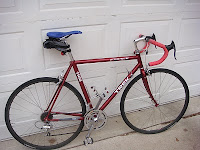Warped wood, salvaged bicycles, and "can" and "can't" people



Earlier this year my wife and I awoke at 5 a.m. to the stroke-inducing sounds of heated, pressurized water splashing on the floor of our laundry room. Our hot water heater had bit the dust. We called the plumber and mopped and sopped large quantities of water and had the hot water heater replaced and thought it was the end of it. But little did we know, the water had seeped under the floor and gotten to the wood floor of our bedroom. And before you can say “absorbent and yellow and porous is he” our floor swelled up (or “got swoll” in the parlance of the street) and warped like Lady Gaga’s fashion sense.
My wife had the idea to try to salvage some of the wood and do something with it, which made very little sense to me. But I’ve been married long enough to know what not to make a big deal over and I gladly kept the least warped wood in the garage until Margaret’s dad could get it.
My father in law, David Spence, is a sho-nuf woodworking craftsman. He has built stuff for us that you can’t believe, including Morris chairs and really nice tables. If he can’t do it with wood it can’t be done. He had the idea to turn the left-over wood into serving trays, which really turned out nice. They look great on the front as you can see in the picture, but the craftsmanship on the back is just as impressive.
The D-D pieces are for David and Dorothy and together they make an S for Spence. The screws that put the handles on are countersunk so they don’t stick out and you’ve got hanging hardware mounted so you can store it on the wall when your wife is not using it to bring you breakfast in bed. The son-of-a-guns are heavy, too, and would make fine weapons. In fact, the big Korean guy from the old James Bond movie who used to decapitate people with his hat has placed an order for a half-dozen. Margaret's dad even made a headboard out of some of the wood and we used the little end-pieces to burn in the firepit on the patio. All in all, a great use for wood that would have been on its way to the dump if it were not for the keen eye of my wife and her dad’s skill.
I have no woodworking skills, but I do know a little about bikes. This summer I rescued this 1993 road bike from somebody who wanted to get rid of it, cleaned it up and adjusted it and swapped out a couple of components. The bike is a 1993 model and I’m pretty sure the tires were original when I got it this summer. When I took the tires off to replace the tubes, the mummified rim tape just disintegrated in my hands. I replaced all that stuff at very low cost and this bike has made a great commuter bike this year. Mountain bikers and fixie riders fear my lethal kick on Welsh street and the bike (“School Baby” is her name) has even completed the gravel-intensive “Bridges without number” ride of Brazos and Grimes counties. So I’ve gotten a lot of use and satisfaction out of a bike that would otherwise be sitting in someone’s garage.
The ability to see a thing and envision what it can be is valuable, but the ability to see a person and envision what they can be is even more so. There were several instances of Jesus doing this. He saw each of the disciples, Zaccheus, the woman at the well, the woman caught in adultery, the people he healed; not as what they were, but what they had the potential to be. And he engaged them, healed them, taught them, spent time with them and gave them space to participate in something huge.
I had occasion this week to think about people who saw potential in me and told me I could do something and people who saw my limitations and told me I couldn’t do something. I owe a lot to both groups. I had lunch today with one of my profs who is going to pass my book on to a publishing company. He’s the very same guy I told a little over two years ago that I was thinking about writing a book. I had this impulse to write a book, but didn’t know how and wasn’t sure I could do it and was telling him this half-hoping he’d say, “Look, you’re just getting into grad school. You need to focus on your studies and think like an academic professional.” Instead, when I said, “I’m thinking about writing a book” he said without hesitation, “You can do it. Just write about what you know and write a little every day and you can do it.” I could go on and on talking about the parents and teachers and coaches and Marines I’ve known who pulled me aside at the right moment and told me, “You have some great abilities in this area. You can achieve great things.”
But I’ve also had people tell me straight up that I couldn’t do things and they’ve been just as motivating. Some people laughed in my face in high school when I told them I’d be a Marine. People in the Marine Corps told me I’d never be able to go to Airborne School or get into Recon. When I was about to go to language training, my boss, a Colonel, told me I’d never be able to learn enough Spanish to do more than order a meal. When we lived in Miami and I wanted to enroll in a translation and interpretation class I was told I didn’t speak Spanish well enough to be in the class and I had to appeal to the next level of administration to get in the class. In my first semester in grad school at A&M, a professor told me I wasn’t scholarly and didn’t have what it took to be successful in the program. I was able to prove all, all of those suckers wrong. Flat wrong. Bad wrong. But make no mistake, I needed that, too. The sting of those comments was like motivation in rocket fuel form.
For all the people who will tell you to your face that you can’t do something, there must be three times that number thinking it who are just too diplomatic to say it. Since there are more “can’t” people than “can” people, I’m going to resolve to be one of those encouragers, one who tells people they have the capacity and potential to do something great. Because we all do.


